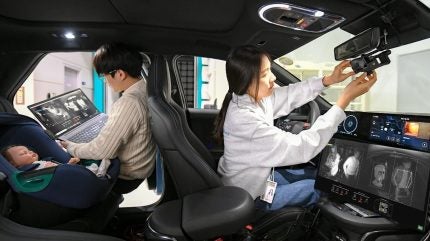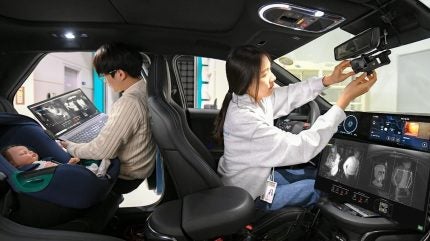
Hyundai Mobis has developed an in-cabin monitoring system (ICM) to enhance passenger safety by detecting ‘risky behaviours’.
Designed to monitor both front and rear seat occupants, the system aims to reduce accidents by alerting drivers and passengers to potential safety risks.
The ICM technology uses cameras to detect the posture, actions, and bio-signals of vehicle occupants in real-time.
The system’s software logic then analyses this data to identify potential dangers and issues audio and visual warnings.
Hyundai Mobis says the ICM system is capable of addressing over ten scenarios, including drowsy driving, mobile phone use, and ensuring children are securely fastened in their car seats.
Hyundai Mobis plans to start taking orders for the ICM from global clients this year.
Access the most comprehensive Company Profiles on the market, powered by GlobalData. Save hours of research. Gain competitive edge.

Your download email will arrive shortly
We are confident about the unique quality of our Company Profiles. However, we want you to make the most beneficial decision for your business, so we offer a free sample that you can download by submitting the below form
By GlobalData
The system has secured ASPICE certification, a European standard for automotive software, and surpassed targets set under the New Car Assessment Program (NCAP), the company said.
Hyundai said it has focused on software logic while developing its In-Cabin Monitoring System.
This year, the firm aims to improve healthcare features for analysing driver bio-signals and accelerate the development of a next-generation 2.0 version designed for commercial fleet services.
Hyundai Mobis electronic control development group leader Shin Kyu-chul said: “With the advancement of automatic driving technology, the demand for in-vehicle convenience features and safety technologies is greatly increasing.
“Hyundai Mobis will focus on developing highly accurate software capable of analysing different physical structures of each passenger.”
Earlier this month, Hyundai Mobis unveiled it claimed to be the “world’s first” full-windshield holographic display at CES 2025 in Las Vegas.
Co-developed with German optical firm Carl Zeiss, the technology is designed to allow drivers and passengers to access essential information through the front windshield.

